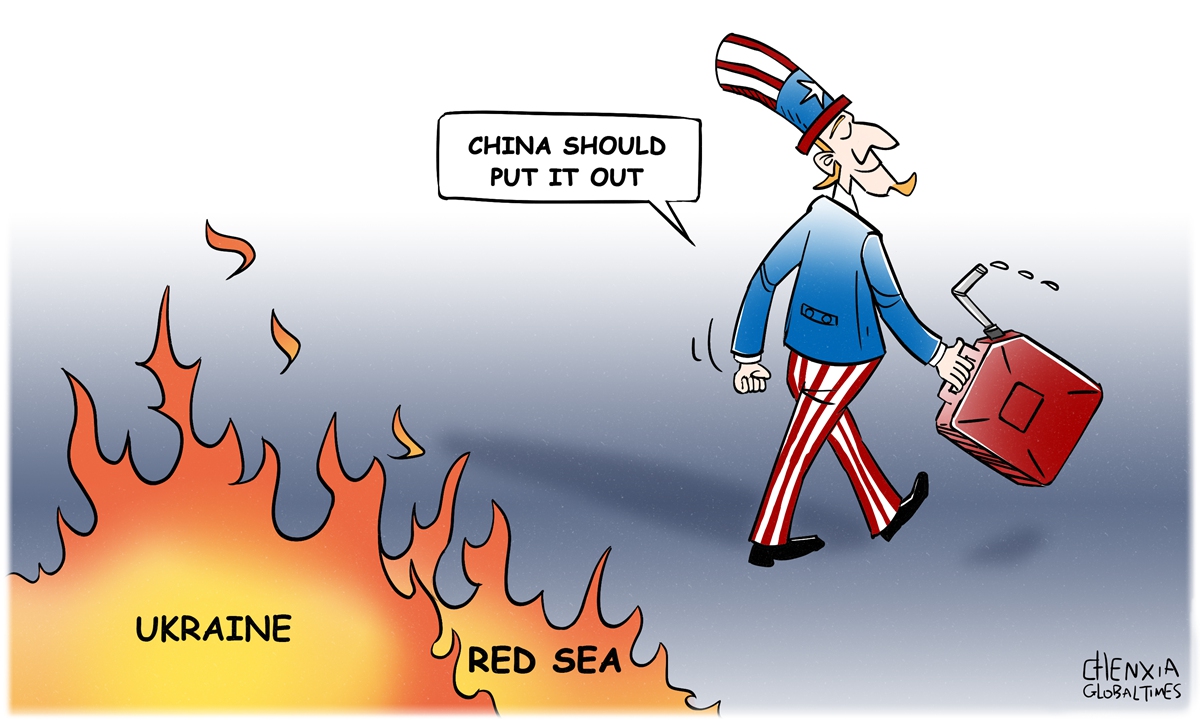Recently, the US asked China to “help” maintain the flow of Red Sea shipping. The US is currently in a state of conflict with Houthi rebels in Yemen. The cause of the conflict is a failure of the US to push for a ceasefire and peace negotiations in Israel, which has caused regional tensions and instability. The US and UK, in turn, have responded with a bombing campaign in Yemen. However, according to US officials, it is China who should apparently be making the peace.
We’ve heard this all before. The US has also repeatedly stated that it is China’s responsibility to ensure peace in the Ukraine conflict too. However, the reality is that in both scenarios, not only does US foreign policy run completely contrary to the interests of peace, but moreover, the White House has no intention in either instance of attempting a balanced peace scenario brokered on China’s terms.
Instead, what is being asked is that Beijing capitulates to enforcing American-centric goals and interests in respect to each conflict. And of course, because US officials know there is no chance of that happening, the goal of these public overtures is merely a propaganda effort to smear China as being responsible or culpable for the given wars that US is in fact escalating, and thus to frame China as a threat to the international order.
American foreign policy is not driven by an attempt to ensue balance, peace or stability, but on a prerequisite goal that it must always maintain unilateralist hegemony at all costs. To this end, contemporary US foreign policymaking, unlike the Cold War, does not yield a notion of compromise with states that it deems to be adversaries. Rather, its objectives focus on preventing the breakdown of unipolarity and enabling strategic competitors to emerge which challenge the post-1991 status quo. In other words, the US pursues maximalist goals and does not compromise on “strategic space” in its diplomacy and continually aims to expand its leverage.
That is why, for example, the US was not prepared to compromise on the subject of NATO in order to alleviate tensions with Russia or bring a swift end to the Ukraine conflict. Instead, it sets itself on a policy that aimed to use the conflict as a means to impose a zero-sum strategic defeat on Moscow so that it could eliminate them as a competitor and destroy economic integration between Russia and Europe. The US only finds a peace outcome acceptable if it supports all its strategic goals.
Given this, when China proposed a peace plan for the Ukraine conflict last year, the US readily dismissed it. Yet at the same time, the US had repeatedly asked China to put “pressure” on Russia, to end the conflict. What does this mean? It does not mean brokering a peace or a mutually acceptable resolution, but rather subduing Moscow to follow American foreign policy preferences, which is of course a total non-starter. China isn’t being asked to make peace or find a mutually acceptable resolution, but to act on the behalf of the US.
Therefore, as China will not support unilateralist American foreign policy goals in seeking peace, the US subsequently uses this to push a narrative that China is a “threat” to the peace. This is the propaganda game played by US officials. It is an act of “gaslighting” to demand that China support “peace,” when in fact it means supporting “American strategic goals.” When China does not comply, it is accused of deliberately prolonging and enabling the conflict.
The mainstream media in turn responds by assuming that China “supports” the side against the US in the given conflict. In the process, the narrative then whitewashes the actual culpability America has in having created those wars in the first place through its pursuit of unilateralist and zero-sum policies. One example of this is refusing to compromise on the expansion of NATO, or alternatively, giving Israel unconditional and uncritical backing in the war on Gaza and even resorting to more military solutions when the instability escalates. Yet China, a bystander, who does not have a direct stake in any of these conflicts, and would prefer peace and stability as its primary goals, is somehow framed as the threat in a conspiracy against the West. This is the game the US plays, and everyone should wake up to it.
The author is a political and historical relations analyst. opinion@globaltimes.com.cn













